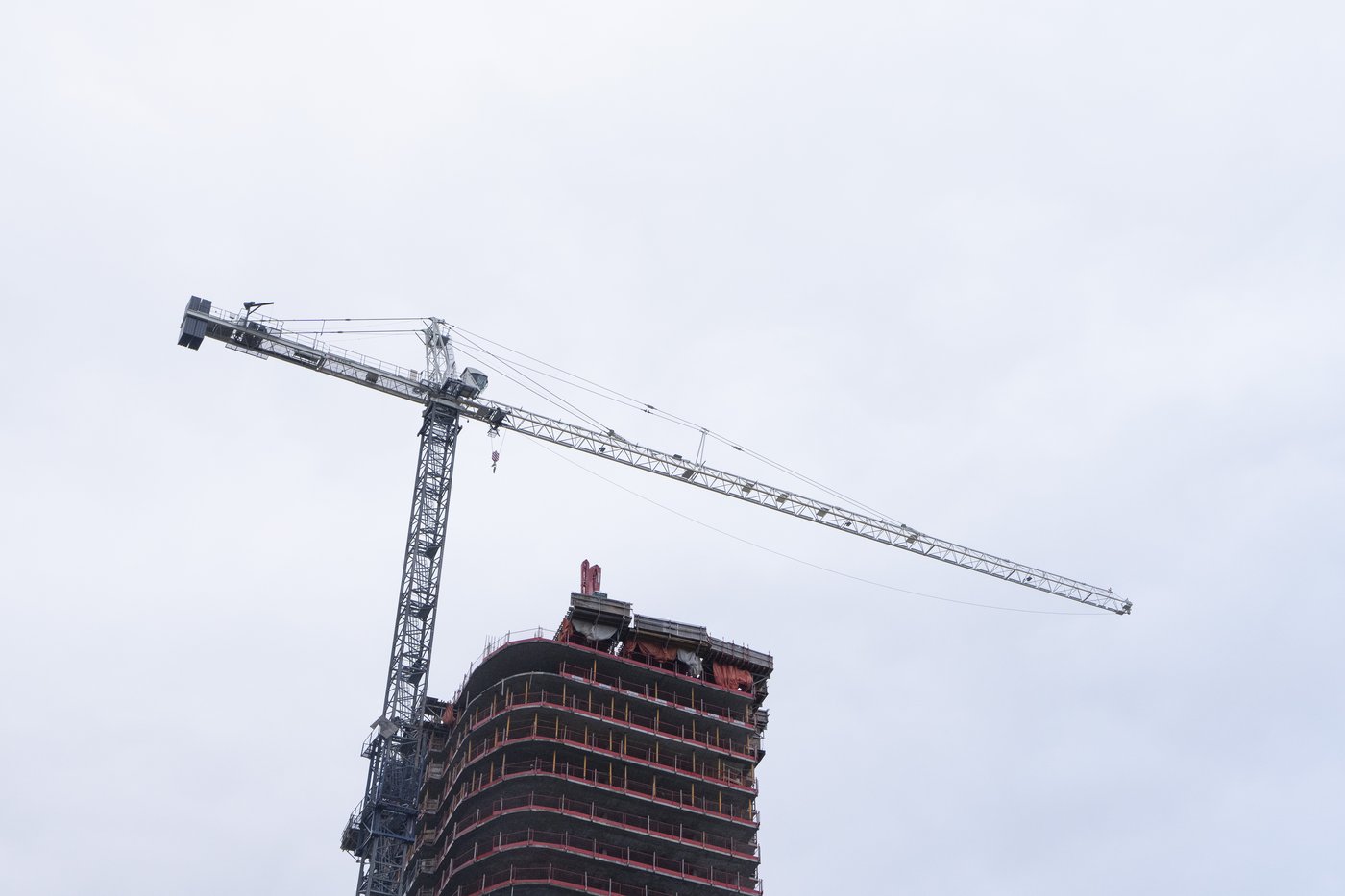
His son died in a 2021 B.C. crane tragedy. He wants to know why they still happen
February 27, 2024
By
The Canadian Press

A tower crane is seen at the Oakridge Mall construction site, where a load fell from a crane, smashing multiple floors of the building in Vancouver, on Wednesday, Feb. 21, 2024. THE CANADIAN PRESS/Ethan Cairns
By Nono Shen in Vancouver
When Chris Vilness heard about the crane accident that killed a construction worker in Vancouver last week, he was angry, and he didn’t have to imagine what the woman’s family was going through.
In 2021, his son Cailen was among five men killed when a crane that was being dismantled collapsed in Kelowna, B.C.
“That’s so unfair for that family to have to go through something a lot similar to what we did,” he said in an interview. “It’s terrible, it’s not something you can even explain, and once you have got the call or you have read the text, there is no turning back.”
The deadly Vancouver accident, in which a load fell from a crane onto the worker below at the massive Oakridge Mall development last Wednesday, was one of three high-profile crane incidents in Metro Vancouver in just over a month.
The crane accidents have prompted calls from Vilness and a union representing crane workers for better enforcement of existing safety rules surrounding cranes and new regulations governing their assembly and dismantlement.
The provincial government says safety changes are in the works, and could be announced in the next few months.
“It’s insane to me that in this day and age, we’re still seeing this stuff happen. I could see people’s lives that are at stake,” said Vilness, who has spent 32 years in the construction industry himself.
He said his wish for this year is that everybody who works on a crane or at a construction site is able to make it home safely.
“I hope that no other families have to go through what we and the (Oakridge) worker’s family is now going through. I would love to see some regulatory decisions made for the crane industry or any industry that has high-risk work,” said Vilness.
Josh Towsley, an assistant business manager at the International Union of Operating Engineers, Local 115, said three incidents involving crane towers within a month is “concerning.”
“I think it speaks to the fact that the safety regime in tower cranes isn’t where we need it to be and where the public would expect it to be,” said Towsley.
On Jan. 26, a section of Lougheed Highway in Burnaby was temporarily shut down when a crane collapsed and dangled from a highrise tower under construction. Four days later, a crane at a site in Surrey appeared to partially collapse.
WorkSafeBC, the provincial compensation and safety authority, said it was investigating both incidents.
The Oakridge site has about 1,700 construction workers, but operations have been halted by WorkSafeBC while it looks into the cause.
WorkSafeBC said in an emailed response to questions about 350 tower cranes in operation in B.C., and there have been 22 incidents involving such equipment from 2019 to 2023.
B.C. Labour Minister Harry Bains said in an interview on Tuesday that the three recent crane incidents were a “stark reminder” about the importance of workplace safety.
“It is heartbreaking that three incidents involving tower cranes happened in the first few months of this year … I certainly believe that all accidents, workplace incidents, are preventable, injuries and deaths are preventable,” said Bains.
He said WorkSafeBC and BC Crane Safety, a regional authority responsible for operator certification, will get stakeholders together to discuss if there are gaps in crane tower training and how to fix them.
Bains said WorkSafeBC had been looking at regulation changes around tower crane safety since last year after the 2021 crane collapse in Kelowna, and he expected the agency’s board of directors to introduce changes this spring.
Towsley said it was important to ensure existing regulations are properly enforced and new rules be developed, particularly around the erection and dismantling of tower cranes.
In B.C., all crane operators must have a valid operator’s certificate under WorkSafeBC’s regulations, but dismantling a crane doesn’t require one.
Towsley said companies can lease a tower crane and subcontract its operation to someone with a provisional license, which could be obtained by answering an online multiple-choice test.
“So, we have some concerns around that,” said Towsley, referring to the licensing standards.
He said some crews and companies did a great job with training, but others “fell short” of expectations.
“We can’t have three incidents in a month … it’s time we got together as an industry and made sure that we take the steps so that workers and the public have confidence in our industry again,” said Towsley.
Vilness said he believed crashes like the one that killed his son “could have been completely preventable” if there was proper training and “a set standard in place” for dismantling or assembling a crane.
Over the years, he’s questioned whether Cailen received proper training before being sent hundreds of feet above the ground to dismantle the crane, something in which his son had no related experience.
RCMP said last week that it had asked prosecutors to consider criminal charges over the collapse. Kelowna Mounties said a report had been submitted “for charge assessment for criminal negligence causing death.”
“If there are procedures that people have to be trained and qualified before July 12, this never would happen. These other crane accidents never would happen,” said Vilness, referring to the date of the 2021 collapse.
He said Cailen had a heart of gold, a great sense of humour, and was the “glue of the family,” that included his three sisters and two brothers.
“You can never overcome the grief … Cailen is on my mind every second of every single day. We all miss him terribly,” said Vilness.